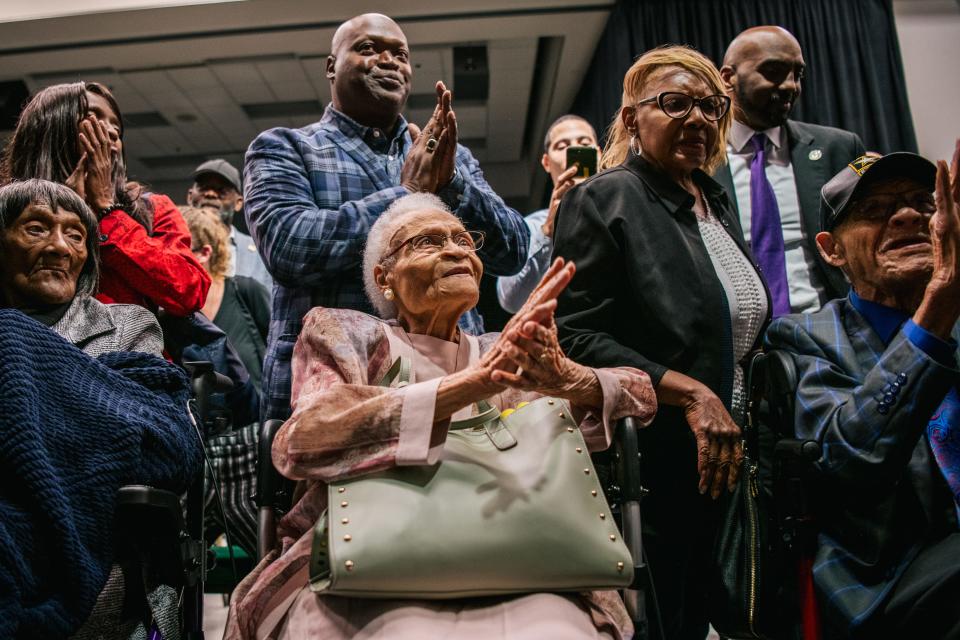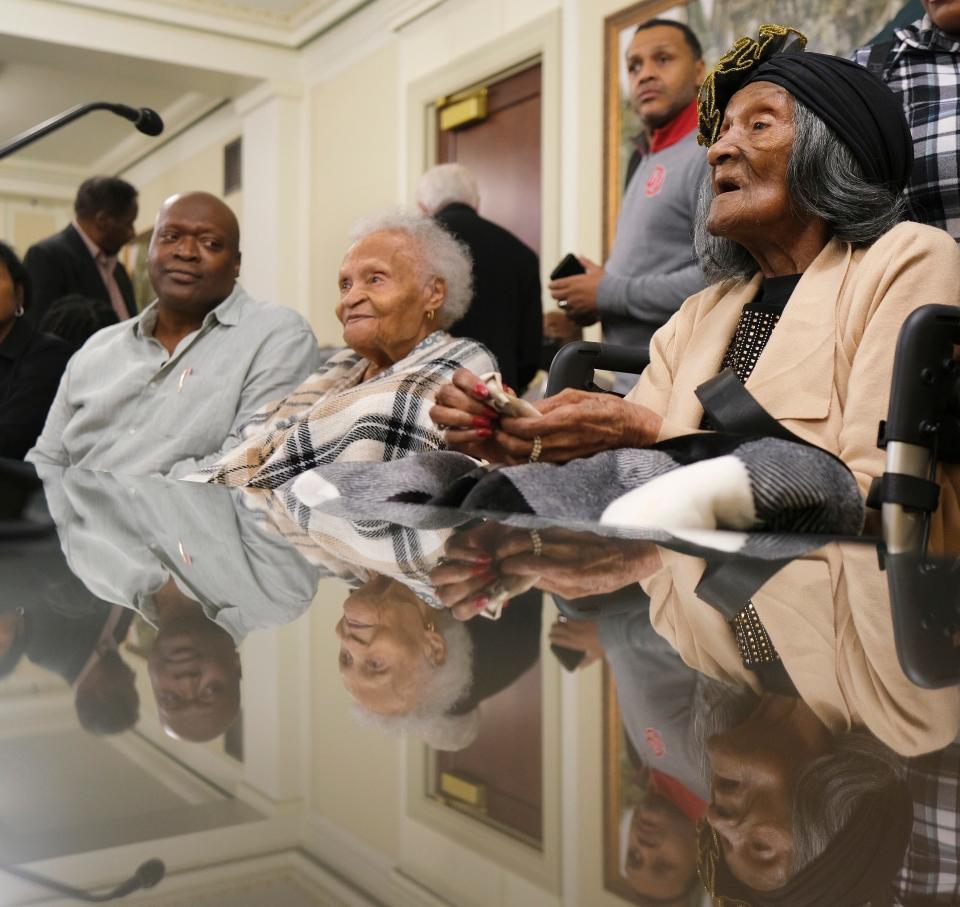Oklahoma court dismisses lawsuit of Tulsa Race Massacre survivors seeking reparations
The Oklahoma Supreme Court on Wednesday dismissed a lawsuit in which survivors of the 1921 Tulsa Race Massacre sought reparations for actions taken against their community. The vote was 8-1.
Survivors Viola Fletcher, Lessie Benningfield Randle and Hughes Van Ellis initially filed the lawsuit in 2020 against the City of Tulsa, Tulsa Regional Chamber, the Tulsa County Commissioners, Tulsa County Sheriff Vic Regalado and the Oklahoma Military Department.
Van Ellis, the youngest of three, died last year at the age of 102.
The lawsuit claimed the 1921 Tulsa Race Massacre represented an "ongoing public nuisance," and that "in 2016, the Defendants began enriching themselves by promoting the site of the Massacre as a tourist attraction."
Last year in Tulsa County District Court, Judge Caroline Wall dismissed the lawsuit. The survivors appealed to the state’s high court.

The state Supreme Court affirmed Judge Wall's decision.
“With respect to their public nuisance claim, though Plaintiffs' grievances are legitimate, they do not fall within the scope of our State's public nuisance statute,” the court wrote in its decision.
The court also held that the survivors’ claim of unjust enrichment was not sufficiently supported.
The race massacre is considered one of the worst incidents of domestic terrorism in American history.
Between May 31, 1921, and June 1, 1921, mobs of angry white men stormed the well-established and prosperous Black community of Greenwood, also known as Black Wall Street, in Tulsa.
The massacre is reported to have started with an accusation that Dick Rowland, a 19-year-old shoe shiner, assaulted a white female teenager on an elevator at the Drexel Building, 319 S Main St.
The female was an elevator operator named Sarah Page, 17. The pair likely knew each other, according to the 2001 Tulsa Race Riot Commission.
The commission investigation found police interviewed Page but that she made no allegations of assault against Rowland.
More than 1,000 homes were burned and businesses left in ruins as 35 city blocks were destroyed, and, though just 39 deaths were listed in official records, estimates now put the number at closer to 300.
Because the massacre was originally deemed a riot, the Oklahoma Supreme Court immunized insurance companies from liability in 1926, meaning none of the Black home or business owners could make claims for property loss.
The commission recommended reparations, but a federal lawsuit filed in 2003 was dismissed less than a year later because the statute of limitations had expired.
In their public nuisance claim, the survivors alleged that because of the massacre, they continued to face racially disparate treatment and city-created barriers to basic human needs such as jobs, financial security, education, housing and justice.
The state Supreme Court found that the survivors’ grievance with the social and economic inequities created by the Tulsa Race Massacre is “legitimate and worthy of merit,” but the public nuisance claim does not fall under the state’s public nuisance statute.
The court wrote that any individuals who could be indicted or held criminally liable for the massacre have long since died, and the survivors did not point to any physical injury to property in Greenwood — rendering it uninhabitable — that could be resolved by way of injunction or other civil remedies.
“And even accepting as true Plaintiffs' claim that the lingering economic and social consequences of the Massacre still, to some extent, endanger the comfort and repose of the Greenwood and North Tulsa communities, those lingering consequences over one hundred years later, standing alone, do not constitute a public nuisance, as that term has been construed by this Court,” the court wrote.
“The continuing blight alleged within the Greenwood community born out of the Massacre implicates generational-societal inequities that can only be resolved by policymakers — not the courts.”
In 2019, former state Attorney General Mike Hunter used the state’s public nuisance law to win a $465 million verdict against opioid manufacturer Johnson & Johnson to abate Oklahoma’s opioid epidemic.
The state Supreme Court overturned that verdict two years later.
As to the Tulsa Race Massacre survivors’ unjust enrichment claim, they alleged that the name "Black Wall Street," a moniker for the Greenwood neighborhood, is used in marketing efforts to promote Tulsa as a tourist attraction, without returning any of those benefits to members of the community, which exacerbated “the pain and trauma of the survivors and descendants of the massacre."
The court found that “neither law nor equity” prevented the defendants from promoting the massacre for historical purposes and community improvement.
“Absent an allegation claiming that Defendants are falsely or fraudulently promising donors that Plaintiffs will share in or benefit from the proceeds of their fundraising efforts, Defendants' conduct itself is not legally unconscionable,” the court wrote.

This article originally appeared on Oklahoman: Oklahoma Supreme Court dismisses Tulsa Race Massacre lawsuit

